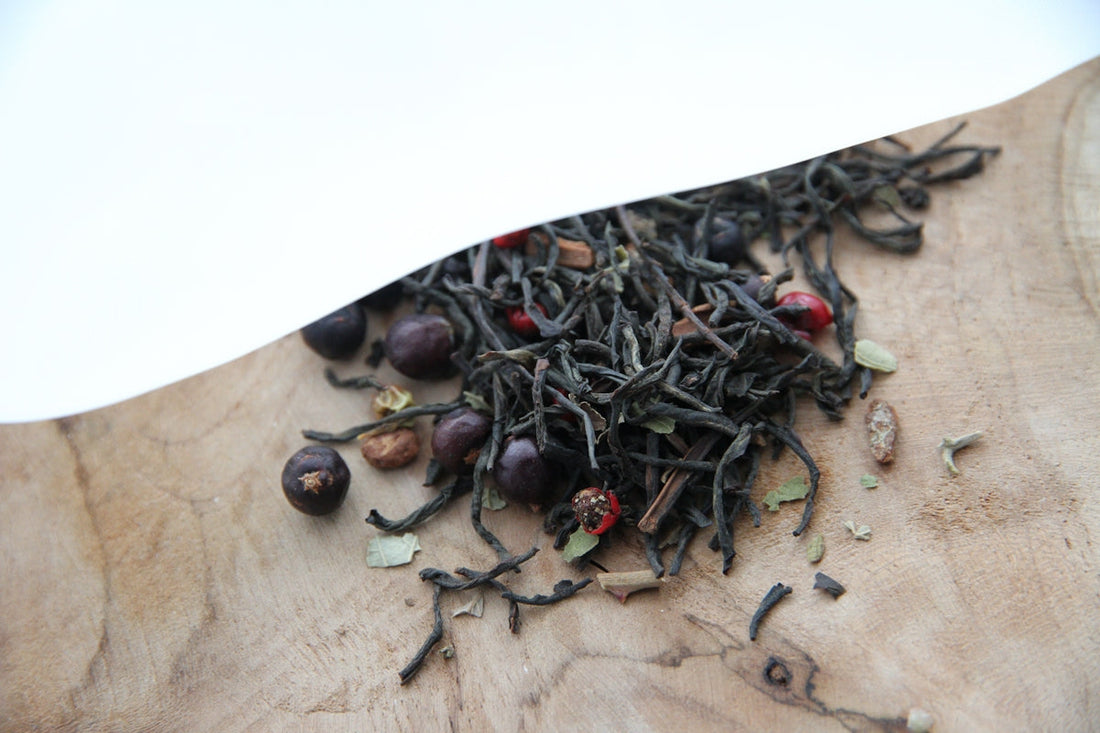
Loose Leaf Black Tea vs Green Tea: A Beginner's Brewing Guide
Tea is a journey, a quiet daily ritual, and a world of flavor waiting to be explored. But for a beginner, the path can seem overwhelming. Where do you start? Two of the most famous gateways into the world of tea are black tea and green tea.
While both originate from the same magical plant, Camellia sinensis, they offer vastly different experiences. This guide will illuminate the essential differences between loose leaf black tea vs. green tea, empowering you to choose your perfect match and brew it to perfection.

Quick Guide: Black Tea vs. Green Tea at a Glance
For those in a hurry, here’s a quick summary of the main differences:
| Feature | Loose Leaf Black Tea | Loose Leaf Green Tea |
|---|---|---|
| Oxidation | Fully Oxidized | Lightly Oxidized/Unoxidized |
| Flavor Profile | Robust, Malty, Strong, Full-bodied | Fresh, Grassy, Vegetal, Delicate |
| Color (Liquor) | Amber to Dark Red | Pale Green to Bright Yellow |
| Ideal Water Temp | 200-212°F / 93-100°C | 160-175°F / 70-80°C |
| Steep Time | 3-5 Minutes | 1-3 Minutes |
| Caffeine Level | Higher | Lower |
| Best Enjoyed | With milk, sugar, or lemon | Plain, to appreciate its subtlety |
| Pairs Well With | Hearty foods, rich desserts, breakfast | Salads, seafood, chicken, sushi |
The Key Difference: How Oxidation Creates Two Unique Teas
The single most important factor that separates black and green tea is oxidation. This is a natural chemical reaction where the tea leaves are exposed to air, causing them to darken and their flavor profile to change dramatically.

Black Tea: Bold, Rich, and Robust
To create black tea, leaves are harvested, withered, rolled to break down their cell walls, and then allowed to fully oxidize. This process transforms the leaves from green to a deep coppery brown and develops a flavor profile that is strong, malty, and full-bodied.
This robust character is what makes black tea the perfect base for breakfast blends and teas that stand up well to milk and sugar.
Our collection includes some exceptional examples:
- For a complex, layered taste with hints of chocolate and malt, try our Jin Jun Mei Black Tea.
- If you enjoy a fruity twist, the Lychee Black Tea offers a delightful fragrant sweetness.
Ready to explore these bold flavors? Shop Our Collection of Loose Leaf Black Teas →
Green Tea: Fresh, Delicate, and Vibrant
In stark contrast, green tea producers work quickly to prevent oxidation. The leaves are harvested and swiftly heated (either by steaming or pan-firing) to halt the enzymes responsible for this process.
This preserves their green color and locks in a much more delicate, fresh flavor profile. Depending on the region and specific processing, green tea can have notes that are grassy, vegetal, nutty, or sweet. It’s a celebration of the tea leaf in its most natural state.
Want to discover this delicate freshness for yourself? Explore Our Premium Loose Leaf Green Teas →
How to Brew Loose Leaf Black Tea vs. Green Tea Like a Pro
Using the right water temperature and steep time is crucial. Get it wrong, and you could end up with a bitter, unpleasant cup.
Brewing the Perfect Cup of Black Tea
Its strong nature means black tea is more forgiving, but precision still yields better results.
- Water Temperature: Use freshly boiled water, around 200-212°F (93-100°C).
- Tea Quantity: Start with 1 teaspoon of leaves per 8 ounces (240ml) of water.
- Steeping Time: Steep for 3-5 minutes. Less time for a lighter cup, more time for a stronger brew. Be careful, as over-steeping can release too many tannins and make it bitter.
Brewing the Perfect Cup of Green Tea
Green tea is far more delicate. Never use boiling water! It will scorch the leaves and result in a bitter, astringent taste.
- Water Temperature: Use much cooler water, between 160-175°F (70-80°C). If you don't have a temperature-controlled kettle, simply let boiling water sit for 2-3 minutes before pouring.
- Tea Quantity: Use about 1 teaspoon of leaves per 8 ounces (240ml) of water.
- Steeping Time: Steep for only 1-3 minutes. Many high-quality green teas can be re-steeped multiple times, revealing new layers of flavor with each infusion.
Still Can't Decide? Your Journey Starts Here
Choosing between the bold character of black tea and the fresh subtlety of green tea is a matter of personal taste. The best way to find out what you love is simply to try them.
If you're feeling adventurous and want to explore a curated selection of world-class teas, our Explorer's Journey Box is the perfect place to start. It’s designed to help you discover your personal preferences without the guesswork.
Frequently Asked Questions (FAQ)
1. Which has more caffeine, black tea or green tea?
Generally, black tea contains more caffeine than green tea. The oxidation process and typically higher brewing temperatures for black tea help extract more caffeine from the leaf. However, the exact amount can vary based on the specific tea, processing, and brewing time.
2. Can I add milk and sugar to green tea?
While it's very common to add milk and sugar to strong black teas, it's generally not recommended for green tea. Its delicate, grassy, and sweet notes are easily overpowered. To truly appreciate green tea, it's best enjoyed plain.
3. What are the main health benefits of black vs. green tea?
Both teas are rich in antioxidants. Green tea is famously high in a category of antioxidants called catechins (especially EGCG), which are linked to various health benefits. Black tea's oxidation process converts these into theaflavins and thearubigins, which are also potent antioxidants with their own unique benefits, particularly for heart health.
